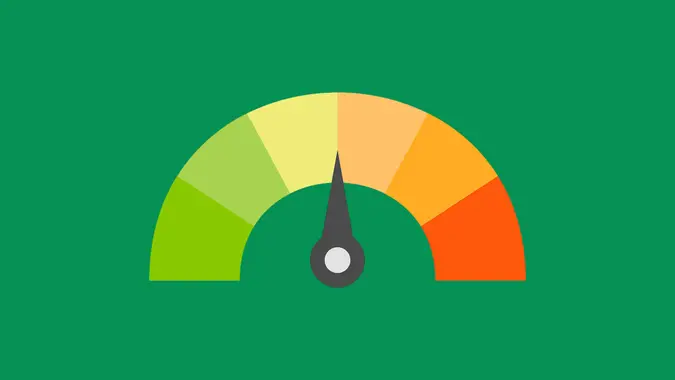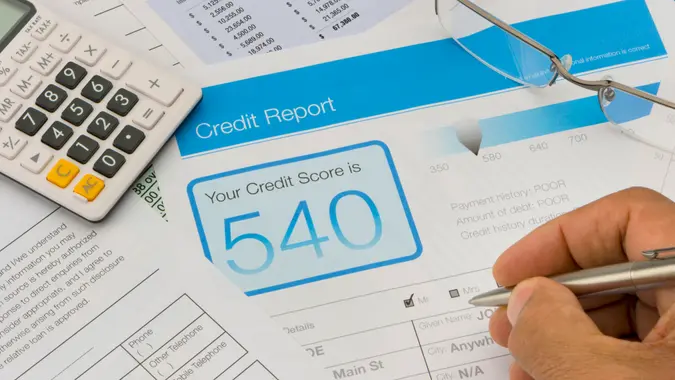Credit Report vs Credit Score: What’s the Difference?

Commitment to Our Readers
GOBankingRates' editorial team is committed to bringing you unbiased reviews and information. We use data-driven methodologies to evaluate financial products and services - our reviews and ratings are not influenced by advertisers. You can read more about our editorial guidelines and our products and services review methodology.

20 Years
Helping You Live Richer

Reviewed
by Experts

Trusted by
Millions of Readers
Your bank app may let you check your credit score for free. But how is that different from your credit report? They are both measures of your financial health, but your score is a three-digit number and your credit report explains how that score was calculated.
Find out how to understand the difference between your credit report vs. credit score.
What Is a Credit Report?
A credit report is a full record of your credit history. It details each and every account you’ve opened. It also includes the following information:
- Personal information. Your name, address and Social Security number are included in your credit report.
- Accounts. All your accounts are listed including credit cards, loans and mortgages.
- Payment history. A detailed payment history of each account is listed.
- Negative payment information. Some of your late payments, collections and bankruptcies are listed on your credit report.
What Is a Credit Score?
You may know your credit score, but what does it mean? Your credit score is a three-digit number that indicates your financial health. It ranges from 300 to 850. If your number is higher, it indicates better credit.
Think of your credit score as your financial grade. The credit report is the report card that explains that grade.
Key Differences Between Credit Reports and Credit Scores
Are you aware of the differences between credit reports and credit scores? This table shows how they compare:
| Feature | Credit Report | Credit Score |
|---|---|---|
| What Appears | Full history of credit accounts and payments | 3-digit number that demonstrates your credit health |
| Where to get it | AnnualCreditReport.com | Through credit apps, credit bureaus, and banks |
| How often it changes | When the lenders report new information | Whenever your credit report updates |
| Importance of what it influences | Check for inaccuracies and mistakes | Approval for loans and credit |
Who Creates Credit Reports and Scores?
You may be familiar with Experian, TransUnion and Equifax, the three companies that generate credit reports.
The credit scores come from companies like the Fair Isaac Corporation (FICO). The FICO Score ranges from 300 to 850 and helps lenders assess a person’s creditworthiness based on their credit history. Most lenders use the FICO score.
Another type of credit reporting model is the VantageScore. It was created by the three credit bureaus to offer an alternative to the FICO score. This number is often shown in free credit apps.
You have more than one credit score because each bureau may have slightly different information about you.
When Do Lenders Look at Your Credit Report vs. Credit Score?
In what instances do lenders look at both your credit report and credit score? And when do they look at one over the other?
Credit Checks by Application Type
| Application Type | What the Lender Checks |
|---|---|
| Loans (Mortgage, Auto, Personal) | Credit Score Credit Report |
| Credit Cards | Credit Score Credit Report |
| Landlords at Apartments | Credit Report Some may check Credit Score |
| Employers | Credit Report |
| Insurance Companies | Some states check credit score |
What Should You Check More Often — Credit Report or Credit Score?
It’s important to review your credit report and credit score. Checking your credit report and credit score will be considered a soft inquiry and impact you adversely. Here’s when you should check both:
- Credit Report: Check once a year to catch errors or fraud. You can use the free tool AnnualCreditReport.com to receive one free credit report annually.
- Credit Score: You can check your scores weekly or monthly to monitor your score’s progress. Credit Karma, Experian and your bank’s app can show your bank scores.
How Mistakes on Your Credit Report Can Hurt Your Score
Mistakes on your credit report can ultimately impact how much interest you pay on your mortgage or credit card. Your credit score is based on your report, and you should regularly review it for errors. According to the Consumer Financial Protection Bureau, some common mistakes are:
- Accounts that aren’t yours: There can be accounts that belong to another person and are attributed to you because of similar names. Also, there is a possibility of accounts that were fraudulently opened because of identity theft.
- Payments were wrongly marked late: You may identify accounts that are marked late but are timely. In addition, there can be closed accounts that have remained open. Sometimes the same debt can be listed twice.
- Old debts that should be listed as paid off: If you’ve paid off certain accounts, these should be listed as paid on your credit report.
If you run across any of these mistakes, you must dispute them ASAP. This is the only way to protect your score.
Final Take to GO
Understanding the difference between your credit report and credit score is key to managing your financial health. Your credit report is a detailed record of your credit history, while your credit score is a numerical representation of that history, used by lenders to assess risk. Both play a critical role in determining your ability to qualify for loans, credit cards and even rental agreements.
Next Steps:
- Check Your Credit Report: Get a free copy from AnnualCreditReport.com to review for errors.
- Monitor Your Credit Score: Use free tools from your bank or a credit monitoring service to track changes.
- Improve Your Credit Profile: Pay bills on time, lower credit utilization, and dispute inaccuracies.
- Stay Informed: Regularly reviewing both your credit report and score helps you maintain strong financial standing.
By taking charge of your credit, you can boost your financial opportunities and secure better lending terms. Want to dive deeper? Explore our expert credit guides here.
FAQs About Credit Report vs Credit Score
A- What’s more important -- credit report or credit score?
- Both are important, but your credit report is the foundation of your credit score. Lenders use your credit report to assess your financial history, while your credit score is a numerical representation of that history. A strong credit report leads to a higher score, which improves your chances of loan approvals and better interest rates.
- Does checking your credit report lower your score?
- No, checking your credit report does not affect your credit score. This is considered a soft inquiry, which does not impact your credit. However, when a lender checks your credit for a loan or credit application, it may result in a hard inquiry, which can lower your score slightly.
- Why is my credit score different on different apps?
- Your credit score can vary because different apps and lenders may use different credit scoring models (like FICO and VantageScore) or pull data from different credit bureaus (Experian, Equifax or TransUnion). Each model weighs factors slightly differently, leading to score variations.
- Can you have a good credit score with a bad credit report?
- Not usually. Since your credit score is based on your credit report, negative marks like late payments, collections or high debt can lower your score. However, if the negative marks are older and you've built positive credit habits your score could still be relatively strong. Keeping your report clean helps maintain a good score over time.
Information is accurate as of March 20, 2025.
Editorial Note: This content is not provided by any entity covered in this article. Any opinions, analyses, reviews, ratings or recommendations expressed in this article are those of the author alone and have not been reviewed, approved or otherwise endorsed by any entity named in this article.
Our in-house research team and on-site financial experts work together to create content that’s accurate, impartial, and up to date. We fact-check every single statistic, quote and fact using trusted primary resources to make sure the information we provide is correct. You can learn more about GOBankingRates’ processes and standards in our editorial policy.
- CFPB "What is a credit report?"
- CFPB "What is a credit score?"
- FICO "website"
- VantageScore "website"
- AnnualCreditReport.com "website"
- CFPB "What are common credit report errors that I should look for on my credit report?"
 Written by
Written by  Edited by
Edited by 






















